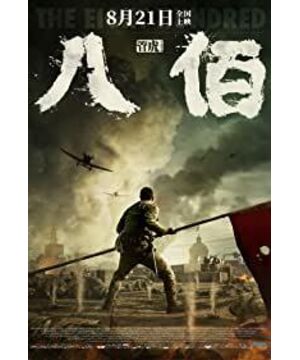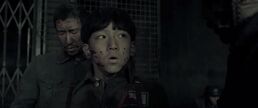Text | Three thousand years old
The film "Eight Hundred" has been released for more than half a month, and the topic has receded, and the intensive value output scene of the self-media cluster bomb style is no longer. At this time, discussing and communicating should not be suspected of being hot, so let's chat. one
The movie "Eight Hundred" was adapted from a real historical event. It was a battle at the end of the Battle of Songhu , China's main battlefield in the Second World War . The historical nodes are fragmented and the battle scale is small. A warehouse, a Suzhou River and a garbage bridge can basically constitute the entire battlefield, and the combat radius is not large, about the size of a medium-sized university playground. It's a small thing, but it's meaningful. GMD executives "showed" the lives of more than 400 people, about 400 people "acted" with the spirit and will of stubbornly resisting the Japanese army, and all forces in the concession on the other side of the river "watched the show" with their own emotions. This deformed historical "landscape" is not too biased, and the film conforms to the basic historical aspect.
Even so, the film adaptation component is more than 80%. It is not objective to question the truth of art with historical truth, at least it is unfair to the film. Movies have no obligation to restore history, and historical films do not have to undertake the responsibility of re-enacting history.
two
The film text is the object of judgment. Only when the object of judgment is clear can it reach a relatively rational zone and draw conclusions that can withstand scrutiny.
The deviation of the public opinion perspective of the film "Eight Hundred" is that there is no clear target. Some people talk about history under the guise of talking about movies, and some people wantonly "kill and make decisions" with cheap labels. The topics are not focused, not precise, this pool of water can only become more and more muddy.
Some people just can't get used to the G Army's resistance to Japan, and they can't get used to seeing deserters and cowards in the film; some people judge the film with inherent cognitive biases, and they are extremely confident. This kind of video passage that is fundamentally in conflict with self-cognition is synonymous with falsehood for them.
Any problem can be brought to the ass, and any topic can be put in the basket of the ass.
How vague and cheap is that MZ consciousness and AG complex. Void enough to deny the established history, cheap enough to deny any option other than the "standard answer".
The film "Eight Hundred" must be an alternative in Chinese films, mainly reflected in two aspects: the particularity of the subject matter and the autonomy of expression. It's been 70 years before we have a film that truly depicts the opposing camp in wartime. It is a rare progress to go back and re-examine a force that was overthrown or ZQ that was overthrown, and express historical thinking in stages in the way of movies. If it weren't for the G Army troops, it would be difficult for us to see specific care for individuals in the movie, as well as the soldiers' awakening process and complex inner descriptions, and some places are quite "negative" and "negative".
If positive advocacy or exaltation becomes a false space, it is better to reflect on history and the reality of war from the bottom up by focusing on the carving and characterization of individuals.
three
Let's make an assumption for the moment: If the defeat of the Japanese army is regarded as a result, then the unconditional surrender of the Japanese army can be summed up as the three main forces: the G army, the Eighth Route Army, and the international forces. Other factors that affect the outcome of the war will be ignored for the time being. If they are quantified, how should they allocate their respective proportions.
Such quantification is inappropriate, and there are no quantification conditions, but it is good for correcting cognition to the point. The defeat of the Japanese army is the result of a comprehensive effect. Everyone will have their own weighting ratio, so I might as well write my own.
National Army (4.5) + Eighth Route Army (2) + International forces (3.5) = Japan's unconditional surrender (10)
One more fact must also be emphasized: On August 15, 1945, the Emperor of Japan announced an unconditional surrender. On September 9, the Japanese surrender ceremony in the Chinese theater of operations was held in Nanjing. China M was represented by the first-level army general He Yingqin and accepted the surrender letter signed with the Japanese commander-in-chief of the invasion of China, Okamura Neji. There are also historians who suggest that the War of Resistance Against Japanese Aggression and the War of Liberation should be considered as a whole. If there is no problem, then the Revolution of 1911 will also be integrated into it.
Turn your back to history and stretch the timeline so your butt sits firmly.
Four
When the first narration scene in the film "Yao Bai" appeared, I laughed, and then I felt an inexplicable pessimism in my heart. Whether internally or externally, the fact that has become history cannot be faced calmly. Where does it come from the mind and self-confidence, let alone overthrow and overthrow it personally. Emphasizing respect for the past and cultural self-confidence all day long, is it really empty talk?
We are good at putting G-necks that can't be implemented in words, printed on newspapers, and written on exterior walls. Specific to the film, of course, there are many problems, but nothing to do with the ass. The butt is still very valuable in my opinion, and it is a plus.
The film commits a common problem with almost all domestic films. It uses lines to force the narrative, and the content that cannot be expressed is said by the actor's mouth, which is convenient and saves trouble. The actors' lines and characters are seriously "rejected" from each other. As far as the many characters created in the film are concerned, they can't say those words in the film at all. This is also a common problem. Don't mention the deletion and removal, what if the release is delayed for a year, everyone is facing the same "mold", why should "Eight Hundred" be "special". This is not political correctness, it is unreasonable. In addition to showing the cruelty and injustice of war, excellent war films have humanistic concerns beyond war, anti-war colors, and human consciousness of reflecting on war in war. The group portraits in the film "Eight Hundred" are like Peking Opera, and they are only acceptable in appearance and only have decorative significance. The inside is like a plate of loose sand, like a collection of dialects, which is not authentic.
I especially like the character "Old Abacus". He is still a "human", with a taste of "human" that may appear in a real war. He is one of the few remarkable characters created by the film. Deliberately pursuing the sense of the stage and the dramatic style are easily reminiscent of "The Cook, the Showman and the Ruffian". No matter how you think and twist, the state of the characters can't stand the baking of the form. The passages of Hou Yong's cheap anger and Russian women's inexplicable sense of justice are too tasteless, and the trivial perspective is of little benefit in presenting the face of war, but is rather useless.
Maybe when Guan Hu's "King Kong River" is released, his butt can return to the "right sitting posture" that some people think, wait and see.
In exchange, you are allowed to film "Eight Hundred", but you have to pay the price of filming "King Kong River".
Fives
After talking about the butt, let's talk about the face. The movie "Mulan" produced by Disney will hit the mainland theaters in a few days. The classic Chinese story in the eyes of the West will face the Chinese public and be tested locally. Ten years ago, Ma Chucheng made a version, starring Zhao Wei, Hu Jun, Chen Kun, etc. The domestic audience did not buy it. I can't photograph my own traditional culture well. Can the new version of "Mulan" from a foreign perspective be photographed? The film was launched on the US network on September 4th, and the domestic schedule started on September 11th, and the high-definition version of the network resources is flying all over the sky. Disney's new bottle of old wine, the prospects are obviously not very good.
I watched the film, and there was indeed a cultural context issue, so I tried my best to persuade myself to go beyond the differences in expression and explore the Chinese classical narratives "produced" by the Hollywood assembly line. The film's explanation of "Qi" seems stupid and clumsy, but in fact it has a sincere and down-to-earth restraint. We hang "Qi" in the air and pursue the ultimate image, which can only be understood but cannot be expressed in words; they put "Qi" into practice, emphasizing function and awareness of survival. A retreat, a pragmatic, there is no good or bad to say.
The tones are bold, bold, intense and compelling. The shape is strange, although it is an oriental feature, it is more inclined to Japanese style. Mulan's image of the phoenix and the image of the witch eagle can be considered to have exerted their own strengths, and the magical atmosphere is just right. One point is too much, and one point is too little. The sense of proportion is good. It's just that there is a feeling of collapse in the second half, and the climbing is powerless. The scene is monotonous, with steep turns and bluntness. The fight in the corridors of the palace is supported by three and a half people, who have been waiting for the rhythm of Mulan's rescue alone, which is really a drama. Mulan's consciousness is also a bit scribbled, with progressive but no levels. Many people care about Westerners' stereotypes and stereotypes of traditional Chinese culture, thinking that they will always see conservative and prejudiced perceptions of China in their eyes. It's the 21st century, and it's time to stop saying that. This is a matter of belly size and mind, and it has not yet risen to the aesthetic level, that is, it cannot tolerate others' wanton tampering with local culture, and the cheap M-ethnic consciousness in the bones is flooding again, that's all. Disney's huge company, even if they don't understand China, it's not difficult to hire a knowledgeable consultant. The key is that they dare to come up with a "self" version. There have been too many versions of "Journey to the West", Japanese, Germans, and Americans have filmed them, but our subconscious only accepts the character image of the eighth or six versions, which is the established aesthetic. When can the established aesthetics be broken, it is not too late to go back and discuss.
Why is the one you photographed called Hua Mulan, to me this is the golden chrysanthemum.
six
Overall, the butt logic of "Eight Hundred" and the face problem of "Mulan" are the same thing. There can only be one face and butt in front of the stage and one hidden. The film "Eight Hundred" is a slap in the face, and it's not enough to fight against the Japanese. You have to follow my ideas, you can't be cowardly, and you can't be too "dazzling" to cover up our "brilliance". This is the logic of the ass, to hide. It's okay to fight infighting behind closed doors, don't let the barbarians see the joke;
The movie "Mulan" is a haunt of cheap and rampant MZism, I can't stand the "red-haired ghost", I can't stand someone serving dishes with a fork on your plate, and I think that not using chopsticks is a great insult to your dish , it looks very unstructured, and it also damages the image of the owner. This is a matter of face and can be publicly criticized on the table. Some people's AG behavior is almost zero cost, and they don't need to pay labor or pay out of their own pockets. They can shout slogans and stand in line. The ultimate form is to turn AG behavior into "business" and enjoy it. In addition, AG will add an aggressive aura to them, and they can kill and make decisions according to their own standards at will, and they are invincible and invincible. While satisfying the desire for power and control, gain a sense of existence. This leads us to judge a literary and artistic work with its own tinted glasses. We don’t have any opinion on how other people’s topics are filmed or changed. When it comes to our own topics, we become extra sensitive and surprisingly “cautious”. If you can't find any flaws, you use your butt to roll it, and if you can't find faults, you use the aesthetic frame. In short, you can move, and if you move "chaos", I will fuck you, until you mess up and stink. The attitude is bad, the behavior is arrogant, and there is absolutely no idea and need for rational discussion. The history of Yaobai itself is singing "plays", and the films made are also "plays", the schedule is "plays", and the withdrawal is still "plays". Today, September 9, as mentioned earlier, is the anniversary of the signing of the unconditional surrender of the Japanese army in the Chinese battlefield after the victory of the Chinese nation's War of Resistance Against Japanese Aggression. And the film "Eight Hundred" is still being shown in theaters, and the artificially arranged "coincidence" makes many people uncomfortable and feel twisted. Movies are a bit out of place for this era, and movies that can make some people uncomfortable are still showing, which, in my opinion, is really comfortable.
September 9, 2020
related suggestion:
Raiders: Resource for Playing Movies
View more about The Eight Hundred reviews











